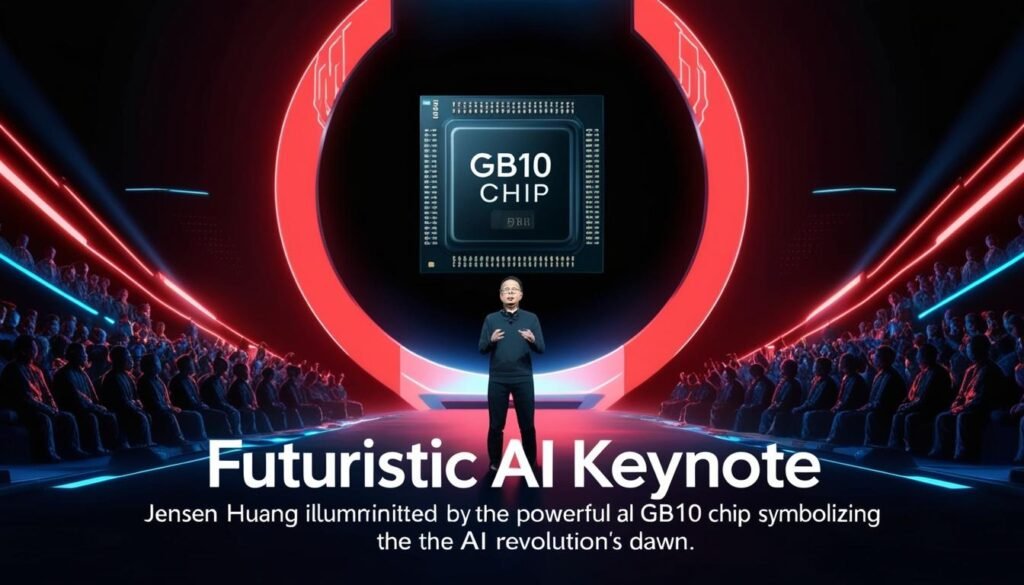During a thrilling keynote address at CES 2025, Nvidia CEO Jensen Huang introduced Project Digits and the GeForce RTX 5090, outlining a future where AI reshapes workplaces and industries.
During Nvidia’s highly anticipated keynote address at CES 2025, held at the Michelob Ultra Arena, the company’s co-founder and CEO Jensen Huang introduced an ambitious vision of a future dominated by artificial intelligence (AI). Addressing an audience of approximately 12,000 attendees, Huang’s presentation resembled the fervour of a rock concert, marked by notable enthusiasm from the crowd, a testament to the excitement surrounding AI advancements.
Huang asserted that the role of IT departments is destined to evolve significantly, proposing that they will soon function as the human resources (HR) departments for an extensive cadre of AI agents. “In a lot of ways, the IT department of every company is going to be the HR department of AI agents in the future,” he stated, eliciting an audible mix of cheers and gasps from attendees. As IT professionals transition from mere technicians dealing with server issues to overseers of digital workforces, each company’s AI agents will be tailored to fit its unique terminology and workplace culture.
Accompanying this shift in focus was the unveiling of Nvidia’s latest hardware innovation, Project Digits, which centres on the new GB10 chip. This compact yet powerful technology is expected to revolutionize desktop AI computing, poised for release in May 2025. Huang showcased the GB10 chip with enthusiasm, highlighting its capability to support robust AI experiences directly from individual workspaces rather than relying on remote data centres.
Nvidia’s influence isn’t limited to AI computing; the company continues to innovate within the gaming sector as well. Huang introduced the GeForce RTX 5090 GPU, retailing at $1,999, which boasts double the performance of its predecessor, the RTX 4090. Moreover, even the entry-level RTX 5070 matches the gaming capabilities of the RTX 4090, praised for its enhanced frame rendering through advanced AI technologies like Nvidia’s DLSS.
Automotive technology was another significant focal point, with Huang discussing Nvidia’s collaborations with major industry players such as Toyota and Continental. These partnerships are harnessing Nvidia’s automotive platform to enhance drivers’ assistance features and push towards fully autonomous driving technologies. “The [autonomous vehicle] revolution has arrived,” Huang declared, estimating this emerging sector may evolve into a multi-trillion-dollar industry.
In addition to applications in gaming and transportation, Huang introduced ‘physical AI’ as an innovative frontier, supported by the Cosmos World Foundation Model, which aims to allow machines to understand and manipulate their environments. He illustrated this concept with the potential of robots exhibiting intuitive capabilities by navigating real-world tasks effectively. Tools such as the Isaac GROOT Blueprint, which uses Apple’s Vision Pro headset, are designed for training humanoid robots in simulated scenarios, further hinting at the broader implications for sectors such as manufacturing and logistics.
The conclusion of Huang’s address painted a transformative picture of a future where human workers and AI entities coexist, radically reshaping diverse industries. This fervent embrace of AI’s potential is generating mounting excitement among industry stakeholders. However, it simultaneously raises questions about the implications for job roles, workplace dynamics, and overall business models in a rapidly evolving landscape.
As the audience departed from the Michelob Ultra Arena, the palpable energy reflected a true buzz around Huang’s declaration: the AI revolution is not only imminent; it is advancing at an unprecedented pace. Nvidia’s stock, which spiked over 3% post-keynote, further emphasised investor confidence in the company’s ongoing growth and innovation trajectory.
Source: Noah Wire Services
- https://dev.to/arjun98k/nvidia-ces-2025-keynote-ai-revolution-and-the-3000-personal-supercomputer-5e6n – Corroborates Jensen Huang’s keynote at CES 2025, the introduction of the $3000 personal supercomputer, and NVIDIA’s vision for the AI-driven future.
- https://www.ces.tech/articles/2025/january/ces-2025-jensen-huang-presents-nvidias-latest-innovations/ – Supports the unveiling of NVIDIA’s latest hardware innovations, including the GB10 chip and the GeForce RTX 5090 GPU, as well as NVIDIA’s advancements in AI and gaming.
- https://dev.to/arjun98k/nvidia-ces-2025-keynote-ai-revolution-and-the-3000-personal-supercomputer-5e6n – Details NVIDIA’s collaborations with major healthcare providers and the impact of AI on healthcare, autonomous vehicles, and creative industries.
- https://www.ces.tech/articles/2025/january/ces-2025-jensen-huang-presents-nvidias-latest-innovations/ – Explains the introduction of NVIDIA Cosmos™ and Project DIGITS, which are part of NVIDIA’s efforts to revolutionize AI computing and physical AI systems.
- https://dev.to/arjun98k/nvidia-ces-2025-keynote-ai-revolution-and-the-3000-personal-supercomputer-5e6n – Discusses the democratization of AI, localized AI processing, and the ethical implications of AI development as highlighted by Jensen Huang.
- https://www.ces.tech/articles/2025/january/ces-2025-jensen-huang-presents-nvidias-latest-innovations/ – Provides details on NVIDIA’s new GeForce RTX 50 Series, including the RTX 5090, and its impact on gaming and content creation.
- https://dev.to/arjun98k/nvidia-ces-2025-keynote-ai-revolution-and-the-3000-personal-supercomputer-5e6n – Corroborates the role of IT departments evolving to manage AI agents and the integration of AI into various industries.
- https://www.ces.tech/articles/2025/january/ces-2025-jensen-huang-presents-nvidias-latest-innovations/ – Supports the information on NVIDIA’s partnerships with automotive industry players and the advancement towards fully autonomous driving technologies.
- https://dev.to/arjun98k/nvidia-ces-2025-keynote-ai-revolution-and-the-3000-personal-supercomputer-5e6n – Explains the concept of ‘physical AI’ and the use of tools like the Isaac GROOT Blueprint for training humanoid robots.
- https://www.ces.tech/articles/2025/january/ces-2025-jensen-huang-presents-nvidias-latest-innovations/ – Details NVIDIA’s commitment to ethical AI and the introduction of tools like the AI Explainability Toolkit.
















